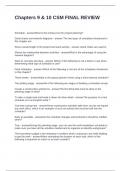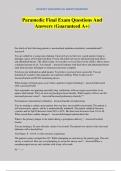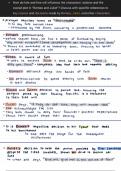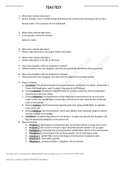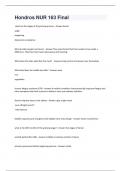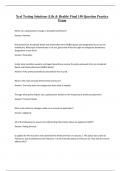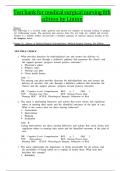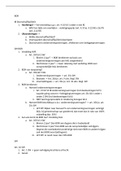P1, M1 & D1: Equality and Diversity and discrimination
Equality is ensuring that every individual is treated fairly and has the same opportunities ( to health
care ) as everybody else regarding of their differences, making sure everyone has the right to and
E34;the opportunity to make the most of their lives and talents. (making sure that their specific
needs are met.)
Diversity is the things that differ us from one another, all about respecting each other’s differences,
respecting every individuals worth, trust, cultures, religions, sexuality, gender reassignment and
lifestyle.
Promoting equality and diversity is very important because it gives everyone equal opportunities, or
treatment in health care regarding their differences to others.
Every professional should promote equality and diversity by practising the anti-discriminatory and
Equality Act 2010, because it empowers every individual and makes them feel valued by the society.
It's critical to encourage equality and diversity so that R and Jim both feel valued. they have separate
requirements that must be met, and so they are receiving separate therapies as well as individual
care plans that include daily activity, medications, and other details. There is no requirement for R to
be aided in maintaining his temperature of the body in his treatment plan, however Jim's care plan
includes information on it. Even if only one of them has a strategy in place, they must be treated
fairly and with respect. It's also crucial to encourage equality and d iversity for R since he not only
has a condition, but he also has mental health issues, as he's unhappy as he can't have his previous
social lifestyle because he can't go about as he used to before.
R has a hard time adjusting to the devices that have been supplied to him, therefore his wants and
preferences should be respected, and if the devices aren't suitable for him or he doesn't want them
as assistance, alternative options should be considered. Adding to R's support will help him cope
with the illness and make him feel more at ease. Jim on the other hand is a football lover. To
promote equality and diversity, an organization or occasion for football games or participating will
make him happy, satisfied and pleased, as he has mobility issues that prevent him from participating
at times. Whether there are clubs and organisations, he will be empowered and diversity will be
promoted since he is not discriminated towards due to his condition/disability.
It is connected to the 2010 Equality Act, that is a key legislation which secures individual rights while
achieving equality for everyone. The Equality Act creates a discrimination law to ensure people are
safe from unfair treatment in order to guarantee that we live in a more equal society. Human beings
have to get treated equally regardless of their race, — in other words where they have been born
and raised; religion, for example Islam and Christianity, gender, female, male or whatever the person
identifies as; age - having an opinion that the older you are, the more mature you are is not right as
age does not determine maturity; disability, — in other words to be in a wheelchair or have low
brain capability; or marriage, that is who they are married to.
M1/D1 :impact of preventing discrimination for the people from the scenario & the success of
promoting anti-discriminatory practise for them and their needs
, Discrimination against individuals because of their race, ethnicity, age, religion, disabilities, sex,
sexual orientation, or religious beliefs is illegal in the workplace and in the society. The Equality Act
2010 protects you if you are discriminated against on the basis of any of these factors. Public bodies,
employers, service providers, companies, and any other organisation performing a public role are all
required to prevent prejudice and promote equality under the Act.
Discrimination
What is it? – treating people unfairly and differently to others due to their race, gender, religion, sex,
sexual orientation, lifestyle, age and disability. There is 4 different types of discrimination, which are:
Unfair discrimination: when an individual is treated unfairly or compared with somebody else. For
example, not receiving the role you wanted at a theatre because of someone else who is younger
than you, even though you and the other person who applied have the same experience and
qualifications required for the role you have both applied for.
Direct discrimination: is when someone is being rude directly to your face because you are different
from them, for example someone coming up to you and calling you names such as “obese” because
you are overweight. This type of discrimination is easier to get proved, as there are other people
who have heard, or witnessing the situation you have been put in and experienced.
Indirect discrimination: is difficult to claim as people usually try to disrespect you “as a joke”. For
example your boss may act supportive and interested in a project that you have made but would
disrespect you and the ideas you have come up with by talking over you, or dismissing you and
making it look as if he was “just joking”.
Positive discrimination: is when someone makes a decision that works your way because you
promote something different, for example if a movie agency looks for a woman with ginger hair to
play a relative for someone with the same characteristics as her, then it is a positive discrimination.
There are several causes for discriminating that make it unlawful to discriminate. Culture is one of
them. A person's culture plays a vital role to them, and it defines who they are in their community. It
is critical in the healthcare setting to respect people's cultural beliefs, the clothes they wear
according to their culture, and the food they consume. That's also essential because it promotes a
sense of belonging and helps the patient feel secure and at peace. Also it increases a sense of well-
being and comprehension. Individuals who are discriminated against because of their culture may
feel excluded, and this may alter how they view themselves since they are assessed depending on
culture.
This might result in mental health problems and depression. Then there's discriminating towards
those with disabilities. You'll work with and assist a lot of people with a disability if you work in
healthcare setting. This is covered under the Disability Discrimination Act, that prohibits
discrimination against people with disabilities, meaning it is illegal. It is critical to be polite because
this can have a negative impact on individual's emotional health and overall health. You as a
specialist, must assist and care for people on a daily basis. The case studies, i have observed that
Jim is a little unstable when it comes to moving around and that he uses a variety of tools to help
him feel extra able of completing tasks. He gets around with the aid of a walking stick and a frame.
Discrimination against his disability should not be encouraged by the professionals who deal with
him.
,Then there's discriminating based on age. When someone is unfairly treated because of their age,
this is known as age discriminating. Discrimination based on your age might make you feel alone and
sad. A different socioeconomic class. Where we live and how we act reveal our socioeconomic
status. Because you are classified as 'wealthy,' some people may treat you better than lower or
medium working class persons. People discriminate based on socioeconomic class in health and
social care settings, for example, a patient who is not dressed in newish clothing & appears to be
poor, and then other person comes in who scents fantastic and appears to be rich.
When a service provider approaches the richer individual first, the other individual is left waiting for
four hours with no one paying attention to both him and his problem. Because no one cares enough
to pay attention to him, the individual will feel isolated and neglected. It would also make him feel
humiliated, which will raise his heart rate, causing high blood pressure and aggravate his illness.
Then there's discriminating based on gender. Gender discrimination occurs when a man, for
example, is treated unfairly in comparison to a female. In the workplace, for example, a female may
do the same job as a male and obtain the same qualifications, yet she will be payed lower.
It might make women feel helpless and useless, which could lead to a variety of mental health
difficulties as well as humiliation. Then there's discrimination sexual orientation and gender identity.
Because certain LGBTQA+ people really aren't accepted in society for various reasons, this form of
discrimination is quite widespread in contemporary culture. If someone is bullied or made fun
of because they prefer others of the same sex, this is known as sexual discriminating. It might make
individuals feel anxious and afraid, as everybody has to be treated fairly and have the same
rights regardless of their sexual orientation. Those who are discrinated against due to their
sexuality may also feel isolated, despite the fact that they should be welcomed into the society in
which they belong. Finally, there is discriminating based on family status. People are discriminated
against because their parents are a part of the lgbtqa.
A child with parents from different races, for example can experience racism from multicultural
group of friends. This can result of the him being bullied or not being accepted into the friend group
because of his race, making it harder for him to create new connections with people (friendships,
relationships and more), leading to him feeling isolated and unhappy because he is lonely and
doesn’t feel accepted.
Discrimination against the service users from the case studies: Luckily, the service users in scenario 1
and scenario 2 did not face any of the 4 types, and no discrimination at all. However, that does not
mean they will not experience it in the future. Referring back to The Equality Act 2010, service user
in scenario 1 – R’s lifestyle could be a reason why he might experience any of the 4 discriminations
that have been mentioned, and scenario 2 – Jim’s lifestyle could make people discriminate him. Both
service users being discriminated against would be illegal according to the Equality Act 2010, as they
would be getting discriminated because of their differences that they have from others.
Scenario 1 impacts on R – he could get discriminated against because he is a transvestite and he acts
like the opposite gender, such as wearing female clothes. Another reason why he could get
discriminated against is that he has no religion as him acting like the opposite gender is considered
forbidden in every religion around the world. He considers himself an ‘atheist’, meaning he does not
believe in god nor has a religion. A professional who is a Muslim or a Christian catholic may refuse to
give R the care needed due to their religion perspectives, and religion purposes. It is a crime to
discriminate him because of his lifestyle and beliefs according to the Equality Act 2010. Another
, reason he could get discriminated against is his age, as it is claimed mainly people in later adulthood
to have strokes and specific needs, for example he might believe that he does not need help and the
support the elderly with the same condition as him get, as he still feels like he could depend on
himself and no one else, even though the professionals think he is not right due to his condition. He
could also feel discriminated against as he dresses like a woman and some people tend not to
tolerate that, which is wrong because that will make him have low self confidence and self esteem.
Professionals did not give him the opportunity to speak and make decisions for himself because of
his age as they thought he still needs the help regardless. In both examples given he would feel not
accepted within the society. This shows that, due to his illness, he has been stopped from access to
care support that is appropriate for his age. Professionals may be intentionally denying him
appropriate access to the treatment and support he needs, which is unjust discrimination and lack of
personal rights and power. R is entitled to the treatment he requires under the Equality Act of 2010,
which states that all service users are entitled to the same degree of care and support. Failure to
achieve equality in his situation could have a devastating impact on his health and well-being. For
example, if his adaption needs are not addressed appropriately for his age, he will feel undervalued.
In a variety of ways, he should always be protected from prejudice. The best option for him is having
an advocate for himself, someone to speak on his behalf as it will be a good decision to have
someone representing him and his views.He would have loss of self esteem to be who he is because
of people not accepting the way he represents himself (dressing like a woman), living in fear of what
others have to say about him, losing himself in the process will be the reason of him becoming
depressed, also loss of self confidence, and stress and being anxious of seeking support and
treatment.
Scenario 2 impacts on Jim - Jim was not exposed to any type of discrimination,
according to the information provided in the case study. However, he may
experience discrimination as a result of his age as he is quite old, 92 years old.
He will also feel discriminated against because, due to his age and illness, his
daughter does not want him to drive. He does not want to give up driving as he
has already given up playing bowls due to his sickness. It is important to prevent
discrimination as If his needs are not met appropriately he will always fear that every time he
speaks up he will have to stop doing something he enjoys. Knowing that he is getting old he will fear
injuring himself and he will fear dying, as his bones are not as strong as they used to be and they
break easily, all the stress would have a huge impact on him. Jim also thinks that driving is
essential for his social interactions, he may get lonely and depressed as a result
of stopping it. It will have a big impact on him such as depression as a result of
not being able to go out and interact with people, so he becomes lonely, as his
daughter lives far from him as well. Jim was involved in an accident at home, and as a result,
he needs constant assistance that he can not perform daily tasks on his own. Unfair discrimination is
the form of discrimination someone might suffer. Jim's nurse and carer may treat him unfairly since
Jim enjoys football and may want to go out to watch his friends play, but his care provider may
refuse and not let him to go on his own. Because he wants to be as active as he used to be, it might
raise the blood levels and make him feel pressured and nervous. Another possibility is that
he considers driving to be a necessary part of his socialisation. The caregiver may refuse to let
Jim drive because the care provider might believe that service user from case scenario 2 is unfit and
not able to, even though it is the other way around, will make him feel not valued enough and
discriminated against because of the not fair treatment he is getting and stopping doing things Jim
loves.


